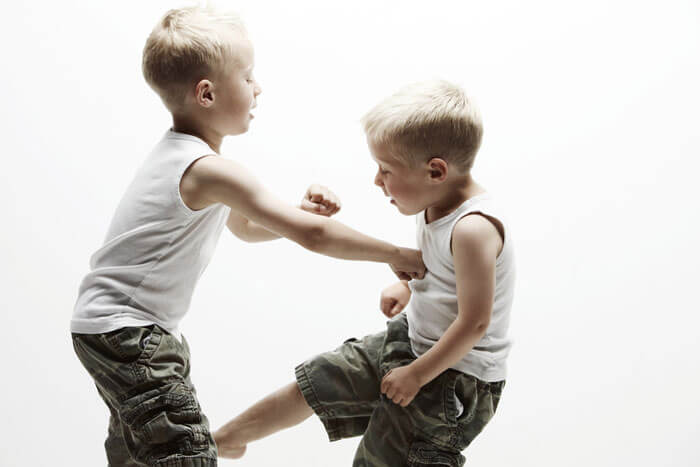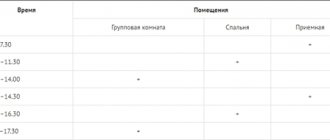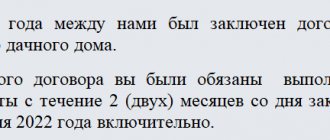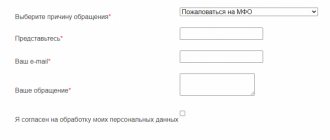Crisis "I myself"
This is an age crisis for the child “I myself.” Parents need to give the child more freedom in those matters where he is already competent; in situations that are safe. This way you will bring peace back to your home.
And by intimidating a child with an “evil guy”, “Baba Yaga”, we get the opposite reaction from the child – aggression. Some children will be afraid and obey, while others will show aggression. After all, aggression is the other side of fear.
It is better to give a calm and firm rebuff to a child’s aggressive attacks: “It’s bad to say that,” “You can’t do that.”
Are there positive aspects to aggressiveness? Yes it:
- protection of its integrity and territory;
- releasing negative emotions and relieving tension;
- defends his interests and personal space;
- determination;
- show others that he can stand up for himself, “fight back.”
There are differences between boys and girls in the manifestation of aggression. Thus, boys demonstrate higher levels of direct and physical aggression, girls demonstrate higher levels of indirect and verbal aggression (i.e., with words).
In general, the male sex is more likely to be prone to physical aggression, while women are more likely to experience indirect aggression (not directly, but through something, through someone, not now, through some actions), and psychological pressure.
The media have a significant influence on the manifestation of aggression on the part of the individual, incl. and a child. Let's consider the mechanism of formation of aggressive human behavior, step by step:
- Excessive passion for TV shows/computer games. This gives rise to aggressive fantasies.
- Next comes identification with an aggressive character.
- Solving problems and influencing people. Here a person learns an aggressive way to solve any problem + how to influence people.
- Using aggression to solve interpersonal problems.
- Increased aggression, because managed to achieve its goal through the use of aggression.
- Aggressive habits are formed.
- This results in undeveloped social skills. The child begins to immerse himself more and more in the world of television/computer, where he has already learned an aggressive way of solving his problems. He achieves solutions to problems in interpersonal relationships with the help of his fists.
- Frustration.
- Excessive viewing of aggression on TV, violent computer games.
Read more: Best Online Child Care Courses
At the same time, it is impossible for a child to constantly remain in such a “sweet”, “compassionate” world. Then he develops a bunch of fears.
Aggressive behavior in children is a way of inappropriately responding to a conflict situation using aggression to resolve the problem.
Aggressive behavior in young children is very often associated with the family atmosphere. In a family, aggression can be tolerated both towards the child and between adult family members. Having become the norm, aggressive behavior is easily transferred to a preschool institution.
Rules of law governing the processing of claims
The fundamental document that the school director must follow in responding to parental complaints is Federal Law No. 59-FZ “On the procedure for considering appeals from citizens of the Russian Federation.”
The regulatory document determines the time frame for consideration and preparation of responses to citizens’ appeals:
- The law allows 3 days for registration of a received application;
- If the solution to the problem is beyond the competence of the administration, then the complaint is sent to another authority. The law allows 7 days for forwarding;
- An official investigation with the preparation of a response to the facts stated in the complaint must, according to the law, be completed within 30 days.
Ignoring the regulations established by law is fraught with administrative liability for school management in the form of penalties. The amount of the administrative fine is in the range of 3,000 - 10,000 rubles. In addition to a fine, a teacher may be subject to legal proceedings, as well as deprivation of the right to engage in teaching activities.
Ignoring the regulations established by law is fraught with administrative liability for school management in the form of penalties. The amount of the administrative fine is in the range of 3,000 - 10,000 rubles. In addition to a fine, a teacher may be subject to legal proceedings, as well as deprivation of the right to engage in teaching activities.
Causes of childhood aggression

- The child’s emotional distress in the family and in kindergarten - he feels bad there. And with the help of aggression, the child tries to achieve stabilization.
- Some negative personality traits of a child.
- Features of established behavioral traits, i.e. the child was taught to behave this way.
- The child simply does not know how to resolve conflicts and controversial situations in any other way, except through aggressive behavior.
- The child imitates the aggression of parents, peers, people around him, what he saw on TV, in computer games.
- Lack of physical activity, physical activity.
- Individual characteristics of the psyche (low level of active braking, starts quickly).
- Constant stimulation of aggressive behavior (media, Internet, computer).
- Parenting style in the family: overprotection - increased attention to the child from the parents + hypoprotection - they do not pay attention to the child at all.
- Unresolved conflicts.
Particularly prone to aggression:
- Children whose inhibitory process is delayed. When punished for random offenses, such children develop an aggressive-defensive type of behavior. The child is constantly ready to fight back and defend himself. He easily and actively comes into conflict with parents and kindergarten teachers, offends the weak, and sometimes resorts to deliberate damage to things and destruction.
- Children who stand out from others: disabled, tall or short, fat. At the same time, they can be either very shy and not attract attention to themselves, or very aggressive, as if compensating themselves for the attacks of others.
- Children in whose families there is a spirit of competition. They may be timid and avoid comparison with successful family members. But they can also be aggressive when they get involved in competition, trying to prove that they are better than their opponent.
Read more: How to attract a man into your life
Child psychologist Olga Chernenko and Dr. Evgeny Komarovsky in the video give recommendations on what to do if your child shows aggression towards other children and what to do if your child was offended or bitten, whether you need to force children to ask for forgiveness:
How can a child express his aggressive behavior?
- Specific aggressive actions: stubbornness, desire to object to elders and peers, refusal; outbursts of anger and rage; desire to humiliate or insult; self-confidence, high self-esteem; the child swears, grumbles, bites, scratches, spits; pugnacity and irascibility.
- Verbal aggression: swears, calls names, comes up with offensive nicknames for peers, unpleasant words. When a small child uses swear words, he “tastes” them and observes the adult’s reaction. If the adult reacted at least somehow (positively or negatively), the child will remember this word for a long time and will use it.
- Aggressive thoughts, intentions that develop in two directions: aggression towards oneself and aggression towards others.
What kind of child can be called aggressive?
After conducting a detailed analysis and answering the following questions, parents (educators) can easily identify an aggressive child from a group of preschool children.
- Who does he attack (the weaker and younger child)?
- How often does this happen?
- Does he attack first or not?
- Under what circumstances does he attack? Is someone provoking him?
Consumer extremism
If your business is the provision of services or trade, then you need to learn to distinguish between several categories of citizen-consumers in order to competently respond to their complaints. And sometimes put careless clients in their place.
So, there are several main types:
- aggressors - those who are ready to flare up over any little thing, usually provoke employees into a scandal, do not like to express their complaints in writing, but are ready to raise dust in your company until they blush;
- truth-lovers - a category of people who respect order in everything, will definitely present their complaints and claims (if any) in writing, often such disputes go to court;
- narcissists are the most harmless group of citizens who sometimes simply do not have enough attention, so they compensate for this deficiency by attracting the attention of other people, in particular, store administration, company managers, etc.
We invite you to familiarize yourself with: What documents are needed to enter into an inheritance in 2020: the list required for registration
Each of these categories of consumers must be treated differently. Therefore, responses to possible complaints must also be based on this classification.
So, it’s better not to argue with aggressors, this will only excite them even more, it’s better to offer a cup of coffee/tea, apologize if necessary, inform them that the perpetrators will be punished, this won’t happen again, etc. These measures are necessary so as not to stir up a scandal and do not scare away other buyers.
When meeting with truth-seekers, it is necessary to stock up on legal knowledge or hire a competent lawyer, since responses to complaints will have to be given in writing, clear, reasoned, based on the norms of the legislation of the Russian Federation. You ask: “How to write a response to a complaint if the client already intends to go to court? And is it worth compiling it at all?” We will answer that it is worth it, since the court requires a complete evidence base.
The last category just needs to be given enough attention, listen to all complaints, wishes, reviews, etc., you can offer them, for example, a loyalty card.
And yet, the main rule when considering complaints and claims from consumers is strict compliance with the rules of law, in particular the Law of the Russian Federation “On the Protection of Consumer Rights,” which provides specific deadlines, rights and obligations, and the procedure for conducting an examination of the quality of goods.
Probably each of us has heard the expression “the customer is always right” in life in a store, cafe or other establishments, but is this true in reality? Let's figure it out.
To illustrate this problem, it is worth giving an example of a complaint from one citizen. The buyer purchased a machine for the production of fence mesh from an individual entrepreneur. I used it for more than a year, after which I wanted to return it to the seller and demand the money back, taking into account compensation for moral damages due to the fact that the machine unexpectedly broke down.
Thus, consumer extremism can be characterized as deliberate actions of the consumer aimed at causing damage to bona fide sellers. At the same time, as judicial practice shows, it is not easy to get rid of an annoying consumer, much less bring him to justice under the law.
Now this situation is gaining momentum, so legislative protection measures are already necessary for entrepreneurs.
Currently, one of the current methods of combating this phenomenon remains a clear recording of negotiations between the seller and the consumer in writing, including the availability of competent samples of responses to complaints.
Complaints in court are a very broad topic. Among all, it is worth highlighting claims in accordance with the Code of Administrative Offenses of the Russian Federation (a complaint against a decision in a case of an administrative offense), with the CAS of the Russian Federation, as well as appeal, cassation, supervisory and private complaints in civil, arbitration and criminal proceedings.
All these complaints have one thing in common - the court gives the answer to them. Other parties to the case can only provide feedback on them. For example, a response to an appeal in a civil case will be called an objection or response.
The content and form of these complaints, reviews and judicial acts on them are provided for by the relevant legislative act (Administrative Code of the Russian Federation, CAS RF, Civil Procedure Code of the Russian Federation, Arbitration Procedure Code of the Russian Federation, Code of Criminal Procedure of the Russian Federation).
Housing and communal services are an area that concerns almost every second citizen. Pipes are leaking, the roof is collapsing, the entrance is not cleaned, there is mold in the apartment, the interpanel seams have not been treated - the list of problems can be continued endlessly.
The recent increase in lawlessness in the actions of management companies, homeowners' associations and other structures gives rise to complaints from residents. The consideration of the latter is regulated by the Housing Code of the Russian Federation, and you can complain to both the housing inspectorate and the court. Collective complaints are particularly common in this area, where residents together outline the essence of their grievances and put forward similar demands.
How to deal with childhood aggression

- Establish a clear ban on aggressive behavior and systematically remind the child about this: “We have a taboo,” “This is not accepted.”
- Teach the child to show aggression in an acceptable way: clapping hands, beating with fists, “calling words” (for example, we swear by the names of vegetables or fruits, animals).
- Contain aggressive manifestations of the child immediately before they appear. Those. you see a child raising his hand - stop him, call him.
The right games and exercises will help you effectively deal with childhood aggression. In the video, options for “correct” games in kindergarten, to be performed both with teachers and at home with parents:
Physically active games splash out accumulated aggression and energy in non-offensive and non-dangerous forms, and they will improve everyone’s mood. At least once a day, children need to have a good shout, run and jump, especially in the fresh air. After the walk, the children will be happy, their appetite will open and a sound sleep in a quiet hour will be ensured.
Read more: The best books on child psychology for parents
“Calling names” with pleasant words, fruits or vegetables, thus developing the child’s sense of humor and imagination.
Primary requirements
The main points regarding receiving a response to a complaint from a student’s parents are enshrined in the Federal Law “On the procedure for considering appeals from citizens of the Russian Federation.” It is recommended that both parties involved in the process familiarize themselves with them. All the stated legal norms may well be trampled upon by officials of any rank.
- within 3 days the registration of the received request is carried out;
- no more than 7 days if the issue is beyond the competence of the director and had to be transferred to the relevant department;
- within up to 30 days, during which the complaint will be examined in detail by specialists and authorized persons.
So, the parents’ desire to fire or punish a negligent teacher will be considered for no more than 33 days, unless the case is redirected to another department. At the end of the specified period, the law regulates the provision of an official response to the application. The sample for a complaint against a teacher does not provide for specific demands from parents, so feel free to ask for an acceleration of the proceedings.
You need to understand that this is just a request, which they have the right to refuse, guided by the norms set out in the law. The response form will contain information that the application is under consideration and clarifications on it will be provided within the time limits established by law.
How not to punish
- You cannot punish a child for aggressive behavior with silence, because... It is very difficult for him to withstand the boycott. To do this, he will need the exertion of all his mental powers.
- You can't say "I don't love you anymore." Deprivation of love is the strongest punishment; it is dangerous to apply to preschool children. Because it undermines the foundation on which a child’s life depends—the love of his parents.
- You cannot shout at a child, because he perceives screaming as a verbal beating. One boy even said, “Mom hits me with words.”
- You cannot punish excessively without observing the rule that “the reward during punishment should be greater than the punishment itself.” It is necessary to emphasize the good in the child’s behavior and reinforce it. But often parents focus on the bad behavior of the child and therefore reinforce all the bad things.
- You cannot punish a child for a long time. The duration should be proportionate to the age of the child. If a child is 1 year old, you can punish him for 1 minute, a child 5 years old can be punished for 5 minutes.
- You cannot reproach or remember the child’s past misdeeds, thereby reinforcing his bad behavior.
Read more: How to overcome childhood aggression?
Related posts:

How to adapt a child to kindergarten: advice from a child psychologist

Easy adaptation of children to kindergarten

Children's aggression
Sample response to a parent complaint at school
- Addressee of the petition.
- Parents' contact information.
- Information about a teacher or director who neglects professional ethics and the rights of children.
- The essence of the problem, its detailed description, basic requirements.
- Signature and date of the paper.
The procedure for managing the educational process in educational institutions. determined by Decree of the Government of the Russian Federation of March 19, 2001 N 196 (as amended on March 10, 2009) “On approval of the Model Regulations on a General Educational Institution”
Nuances
Before writing an application, parents can call the hotline and get advice about the current situation. Telephone numbers may vary depending on your region. The hotline is being created at the initiative of the Department of Education. Using it, a person will be able to contact a specialist and receive a competent answer. Calling the hotline can prevent further development of a specific conflict situation.
Additional Information
If a child begins to complain about a school teacher, it is recommended to pay increased attention to what is happening, but do not write a statement based on the minor’s first word. Cases of unacceptable behavior on the part of teachers in Russian schools are indeed not uncommon, but children do not always tell the truth. The parent must understand what is happening before acting.
Single or collective complaint
Drawing up a complaint from the parents of one pupil takes place in the event of dissatisfaction with the teacher on only one side. If complaints against a kindergarten teacher are voiced by several people at once, then it would be advisable to write a collective complaint.
The form of both options is approximately the same, with the only difference being that in the second case all parents sign the text of the complaint.
A sample of a collective complaint against a kindergarten teacher is similar to a single one:
- Full name and position of the person to whom the complaint is sent.
- The title of this document (i.e., “Complaint”).
- Full name of the employee (teacher), whose actions/inaction led to the filing of claims by several parents.
- Specific description of violations and their evidence.
- Requirements and time frames within which filers want to receive a response to their complaint.
- Full name of the compilers of the complaint.
- Date and signatures of all parents.
Lawyers recommend that parents join forces, because according to statistics, collective complaints have a more effective impact on officials compared to individual complaints. And as a result, checks on such complaints are carried out as quickly as possible, and the requirements are almost always satisfied.









